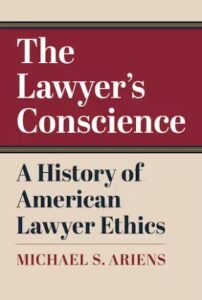This is the second in a series of three blog posts this week by Marquette law faculty on a new book.
 In The Lawyer’s Conscience: A History of American Lawyer Ethics (University of Kansas Press 2022), Professor Michael Ariens provides a history of lawyer ethics and identifies problems that make it difficult for modern lawyers to live up to the ideals of an ethical lawyer. Conceptions of the ideal lawyer have changed from the late 1700s to the present day, and the book provides historical examples of lawyer ideals at different points in history. Broadly speaking, the historic honorable lawyer was motivated primarily by a sense of duty to conscience and regard for the public good. The honorable lawyer was committed to serve as a professional and did not attach undue importance to matters such as fees or client preference.
In The Lawyer’s Conscience: A History of American Lawyer Ethics (University of Kansas Press 2022), Professor Michael Ariens provides a history of lawyer ethics and identifies problems that make it difficult for modern lawyers to live up to the ideals of an ethical lawyer. Conceptions of the ideal lawyer have changed from the late 1700s to the present day, and the book provides historical examples of lawyer ideals at different points in history. Broadly speaking, the historic honorable lawyer was motivated primarily by a sense of duty to conscience and regard for the public good. The honorable lawyer was committed to serve as a professional and did not attach undue importance to matters such as fees or client preference.
Through classroom discussions in courses such as The Law Governing Lawyers and Professional Identity Formation (and even Legal Writing and Research), I know that students yearn to practice in an age when the public perceived lawyers as esteemed community members safeguarding the public good. The Lawyer’s Conscience has inspired me to bring more historical perspective into these discussions. I want my students to know, for example, that the problem of lawyer misuse of power is not new and not reserved for the modern age, even if modern developments have introduced new and different problems. For a very long time, lawyers have had to embody conflicting roles, serving as advocate and counselor but also as an officer of the court and legal system reformer.
After reading the early chapters of Ariens’s new book, I made a note to tell students in future classes that lawyers have always had a “PR problem”—not professional responsibility but public relations. The age in which lawyers were universally respected and revered does not seem to have existed. In fact, in early American history, many feared the power lawyers could have in society. Members of the public have always distrusted lawyers (if they gave any regard to lawyers). Moreover, lawyers have always distrusted other lawyers. (I’m going to teach students the term “pettifogger” in the hope that this term might be useful should they ever need an pejorative term for lawyers who are untrustworthy and prone to quibbling over inconsequential matters.)
Although The Lawyer’s Conscience does build to conclusions about modern lawyers and the ways in which legal ethics codes have failed to stop lawyer abuse of power in a changed profession, this book is inspiring me especially to add more historical context to classroom discussion. To give just one example, I plan to share with my students that in 1786, under the pen name Honestus, Benjamin Austin, Jr., wrote several essays (later published as a book) that derided lawyers and English common law, noting that lawyers were “useless” and “dangerous” and that they were “daily growing rich” by collecting “enormous fees,” as Ariens recounts. Lawyer responses to this writing at the time articulated what ideals lawyers should hold, and Austin eventually changed his position such that instead of calling for the annihilation of lawyers, he called for regulation. (Austin’s young adult son was later killed by a lawyer who was offended by Benjamin Austin’s criticisms of lawyers. The struggle over honor and reputation had tragic consequences there.)
Ariens’s book sets forth many more historical lawyer scandals that I plan to share with students. We may benefit in class from comparing the earlier instances to lawyer scandals and public response today. I will also have students consider how lawyers in the past tried to reconcile the tension inherent in the multiple roles served by lawyers and ask them to compare that tension to pressures of modern lawyering. The Lawyer’s Conscience details the various ways lawyers have tried to earn public trust and establish lawyer standards, including appeals to honor and conscience and integrity, deep discussion about the nature of professionalism, and creation of oaths, canons, codes, and regulations. Despite all these attempts, the legal profession continues to face pressing problems. The book raises big questions worth pondering in class.
I’ll be interested in student response to the questions on a smaller scale, too. I want to know what kind of lawyer my students want to be. I want them to consider how ideas such as honor, conscience, integrity, and professionalism will play a role in their formation. Students are starting to forge professional lawyer identities for themselves, and it is an excellent time to reflect upon who they aspire to be and why. Daily choices will inform the legal professionals they will become. They will face pressure in balancing lawyer roles and in balancing their own needs to earn a living and maintain good health and enjoy life. I’ve had these discussions in class before, but I look forward to doing so again with reference to more historical context now that I’ve read Michael Ariens’s book.
